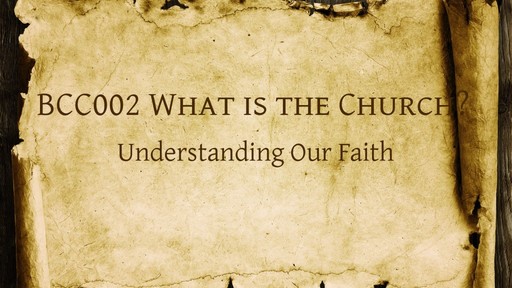What is the Church? BCC002

Introduction
What is Church?
Most frequently the word indicates a local group of Christians living in a certain place (1 Co 1:2; 1 Th 1:1; Rev 1:11 and many more). (4) The New Testament gives to this word a technical meaning when it refers to the church universal to which all believers and only believers belong; this is the same as the body of Christ
Key Verses
What is a local Church?
: A local church is an assembly of professing believers in Christ who have been baptized and who are organized to do God’s will. Notice: (1) There must be a profession of faith—not just anyone can belong to a local church. (2) The New Testament knows nothing of unbaptized church members. (3) Churches were always organized as soon as possible (Ac 14:23)—an informal, unorganized fellowship of believers does not constitute a church. (4) There is purpose—doing God’s will which is expressed in many ways (like observing the ordinances, being open and available for ministry to all
this definition does allow for some flexibility. It does not require that a local church meet in a building specially set aside for such a purpose. It does not indicate what kind of or how many meetings are required to constitute a church.
The New Testament teaches the principle of believers gathering together. But in New Testament times they gathered in homes. Are we today allowed the flexibility of building church buildings, or should we follow the pattern of meeting in homes?
What is the Purpose of the Church?
What does Christ expect of the church? While there may be many ways such a question could be answered, here are a few suggestions:
1. The local church should always show its love for the Lord (Rev 2:4).
2. The church should minister to its own members so that they incite one another to love and good works (Heb 10:24).
3. The church is the agency for carrying out the Great Commission. While witnessing and teaching obviously can and should be done by individuals, these are also functions of the local church. The gospel should be preached in the services of the church so that when unbelievers come in they can hear it (1 Co 14:24), and all the epistles bear testimony to the teaching ministry of the local congregation.
4. The church is to care for its own who are in need, such as widows and orphans and the poor (Ja 1:27; 1 Ti 5:1–16; 2 Co 8–9).
5. The church is to do good in this world (Gal 6:10).
6. But basically the purpose of the church is to produce mature, stable, holy Christians. Doing this will sometimes involve discipline in the realm of morals (1 Co 5) and maintenance of purity in doctrine (2 Ti 2:16–18).
Pictures of the Church
The relationships between Christ and His church are illustrated in a number of intriguing figures in the New Testament. Each one is worthy of detailed study, though we can only mention them here.
1. Christ is the Shepherd and we are His sheep (Jn 10). His care for us and our security in Him are the salient features of this illustration.
2. Christ is the vine and we are the branches (Jn 15). Fruitfulness comes only as we draw strength from the vine.
3. Christ is the cornerstone and we are the stones in the building (Eph 2:19–21). A cornerstone gives direction to the entire building and is, of course, laid only once.
4. Christ is the High Priest and we are a kingdom of priests (1 Pe 2). As priests we can offer ourselves, our substance, and our service (Ro 12:1; Heb 13:15–16).
5. Christ is the Head and we are the members of His body (1 Co 12). As Head He directs; as members we serve each other through the exercise of the spiritual gifts which He as risen Head gives.
6. Christ is the last Adam and we are the new creation (1 Co 15:45). By faith we are placed in Christ, the last Adam, to partake of His resurrection life and power (Ro 5:19).
7. Christ is the Bridegroom and we are His bride (Eph 5:25–33; Rev 19:7–8). Everlasting love and the intimacy of the relationship of bridegroom and bride are the obvious points of this illustration.
8. Christ is the Heir and we are joint-heirs (Heb 1:2; Ro 8:17). This assures us of sharing in all the glories which shall be His when the world acknowledges Him.
9. Christ is the firstfruits and we are the harvest (1 Co 15:23). His resurrection guarantees ours.
10. He is the Master and we are His servants (Col 4:1; 1 Co 7:22). The servant does the will of his master, and in turn the master binds himself to take care of the servant.
